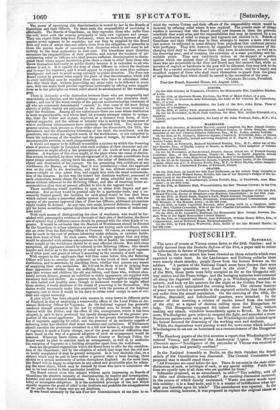POSTSCRIPT.
SATURDAY.
The news of events at Vienna comes down to the 29th October; and is chiefly derived from the Deutsche Reform of the 31st, a paper said to colour its information in favour of Imperialism.
Thus far, the main attack has been directed on those suburbs which were expected to resist least. In the Landstrasse and Erdberg suburbs there were merely sham attacks; people threw from the houses flowers on the soldiers. " A portion of the National Guard must have thrown their arms away, for large quantities were found in the river." By the night of the 28th, these parts were fully occupied as far as the Gloggnitz rail- way station and the Franz bridge; and the besieging batteries were extended all along the Jagerzeil suburb. At eight p.m. Windischgrfitz entered the suburb, and took up his quarters for the night at the Golden Pear inn; as he had (it is said) anticipated the evening before. The citizens desirous of peace were invited to assemble in the captured suburbs, that they might not suffer from the armed population. On the morning of the 29th, the Wieden, Mariahilf, and Scholtenfeld quarters, were attacked. In the course of that morning, a column of smoke issued from the interior of the city, as a signal of distress calling upon the Hungarians for help. The Hungarian vanguard did indeed show itself; but, without., making any attack, withdrew immediately again to Bruck. In the fore- noon, Windischgratz gave orders to suspend the fight, and accorded a truce. Numerous parties came out to parley; but Windischgratz still insisted upon his former demand for disarming of the working men and students.
While the deputations were passing to and fro, news came which induced Windischgratz to set out on horseback on a reconnoissance of the Hungarian camp.
The Hamburg papers of the 31st mention a report that Windiscbgratz had entered Vienna, and disarmed the Academical Legion. The iforniag Chronicle says—" Intelligence of the surrender of Vienna was received in town last night, and partially credited."
























 Previous page
Previous page